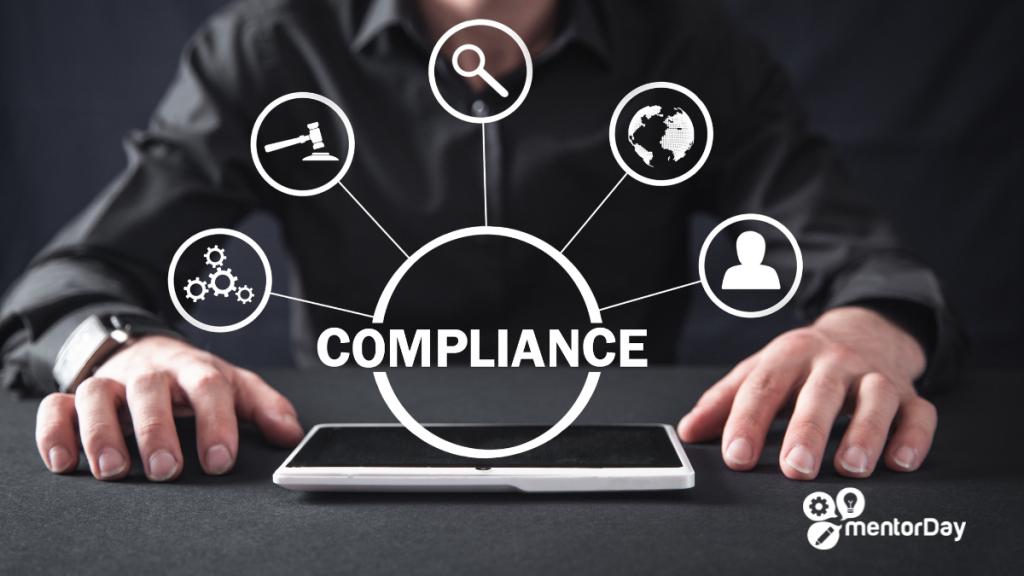✅ ¿Qué es el Compliance?
El compliance se refiere al conjunto de políticas, procedimientos y controles internos que implementan las empresas para garantizar el cumplimiento de las leyes, regulaciones y normativas aplicables. También abarca la adhesión a estándares éticos y de conducta que promueven la integridad, la transparencia y la responsabilidad empresarial.
Su objetivo principal es prevenir, detectar y corregir posibles infracciones legales o normativas, reduciendo el riesgo de sanciones, multas y daños reputacionales.
🎯 Objetivos y beneficios del compliance
Un programa de compliance bien implementado aporta múltiples beneficios:
- Previene violaciones legales y minimiza el riesgo de sanciones.
- Fomenta una cultura ética y de cumplimiento en toda la organización.
- Refuerza la reputación empresarial y la confianza de clientes, socios e inversores.
- Identifica áreas de mejora en procesos internos.
- Protege a la empresa y sus empleados frente a riesgos legales y financieros.
📌 Ámbitos que abarca el compliance
El compliance puede aplicarse a diversas áreas dentro de la empresa:
- Protección de datos personales.
- Prevención del lavado de dinero y financiación del terrorismo.
- Anticorrupción y conflictos de interés.
- Cumplimiento fiscal, laboral y ambiental.
- Seguridad en el trabajo.
- Propiedad intelectual.
🧭 Compliance vs. Código de Conducta
Aunque están relacionados, tienen enfoques distintos:
- El compliance se centra en garantizar el cumplimiento legal y normativo.
- El código de conducta establece los valores y principios éticos que deben guiar el comportamiento de todos los miembros de la organización.
Ambos son fundamentales para construir una cultura empresarial sólida. Mientras el compliance evita riesgos legales, el código de conducta fortalece la integridad organizacional.
🚀 Implementación de compliance en nuevas empresas y startups
En el contexto de una nueva empresa, es crucial incorporar el compliance desde el inicio. Esto no solo evita futuros problemas legales, sino que también genera confianza con inversores, clientes y colaboradores.
Pasos clave para implementar un programa de compliance:
- Identificación de riesgos
Analizar los riesgos legales, financieros, operativos y reputacionales específicos del sector y modelo de negocio. - Creación de políticas y procedimientos
Establecer normas claras sobre conflictos de interés, privacidad de datos, anticorrupción, protección de propiedad intelectual, entre otros. - Desarrollo de un código de conducta
Definir los valores de la empresa y las expectativas de comportamiento para empleados, directivos y socios. - Formación y capacitación
Educar a todos los colaboradores sobre las políticas de cumplimiento y su papel en el respeto a la normativa vigente. - Supervisión y auditoría
Implementar mecanismos de seguimiento, auditorías internas y canales de denuncia confidenciales para detectar y corregir irregularidades. - Evaluación de terceros
Realizar una debida diligencia a proveedores y socios estratégicos para asegurar que también cumplen con estándares éticos y legales.
🌍 Compliance en la internacionalización de una empresa
Al expandirse a nuevos mercados, es indispensable adaptar el programa de compliance a las regulaciones locales del país de destino.
Aspectos clave:
- Conocimiento normativo local: Identificar las leyes aplicables en materia fiscal, laboral, comercial, de privacidad, etc.
- Ajuste de políticas internas: Adaptar procedimientos y controles a las exigencias regulatorias extranjeras.
- Capacitación contextualizada: Formar al equipo en aspectos legales del nuevo entorno.
- Evaluación continua: Revisar regularmente la eficacia del programa y actualizarlo según cambios normativos o del entorno.
- Due diligence a terceros locales: Asegurar que proveedores y socios respetan las normas del país y los valores corporativos.
💼 Rol del emprendedor en la aplicación del compliance
El emprendedor debe asumir un papel activo en la implementación del compliance:
- Compromiso con la integridad: Establecer desde el inicio una cultura basada en el cumplimiento.
- Diseño del programa de cumplimiento: Elaborar políticas adaptadas al tamaño y riesgo de la empresa.
- Formación continua: Impulsar la capacitación del equipo y liderar con el ejemplo.
- Seguimiento y mejora: Evaluar el impacto del programa y ajustarlo cuando sea necesario.
Contar con el acompañamiento de expertos legales o consultores en compliance puede ser muy útil, especialmente en etapas tempranas.
🧪 Ejemplos prácticos de medidas de compliance en nuevas empresas
- Política de ética empresarial: Establecer un código de conducta claro y accesible.
- Debida diligencia a proveedores: Verificar antecedentes y prácticas de socios estratégicos.
- Prevención del lavado de dinero: Identificar clientes y monitorear transacciones sospechosas.
- Protección de datos personales: Implementar medidas de seguridad y privacidad según la normativa local (como el GDPR o leyes nacionales).
- Cumplimiento tributario: Presentar declaraciones y cumplir con las obligaciones fiscales en tiempo y forma.
- Anticorrupción y soborno: Capacitar en prácticas justas de negocio y establecer controles internos robustos.
- Propiedad intelectual: Registrar marcas, patentes y derechos de autor, y evitar infracciones de terceros.
🧩 Conclusión
El compliance es una herramienta esencial para toda empresa, especialmente en sus primeras etapas y durante procesos de expansión. Implementarlo de forma temprana no solo ayuda a prevenir riesgos legales y financieros, sino que también construye una base sólida de confianza y credibilidad frente a clientes, empleados, inversores y autoridades.
Tanto el cumplimiento normativo como el comportamiento ético son pilares de una gestión empresarial responsable, sostenible y competitiva.
CASO PRÁCTICO
Juan es un emprendedor que ha creado su propia empresa de comercio electrónico. Él quiere asegurarse de que su empresa cumple con las normas y regulaciones aplicables y evitar posibles multas y sanciones. Para ello, decide implementar un programa de compliance. Juan comienza identificando las áreas de su empresa que podrían verse afectadas por el compliance. Estas incluyen, entre otras, la gestión de datos personales de los clientes, el cumplimiento de las leyes fiscales y la seguridad de la información.
A continuación, Juan establece un equipo de compliance compuesto por diferentes miembros de su empresa, como el responsable de finanzas, el de recursos humanos y el de tecnología. Este equipo se encargará de revisar regularmente los procesos y procedimientos de la empresa y de asegurarse de que se ajustan a las normas y regulaciones aplicables.
Además, Juan desarrolla un código de conducta que establece los valores y principios éticos de la empresa, así como las obligaciones de los empleados. El código de conducta es comunicado a todos los empleados y se les requiere que firmen una declaración de conformidad.
Por último, Juan establece medidas de supervisión y control para asegurarse de que el programa de compliance se está implementando y cumpliendo de manera efectiva. Estas medidas incluyen auditorías internas regulares, revisiones externas de cumplimiento y la designación de un responsable de compliance. Con la implementación de su programa de compliance, Juan se asegura de que su empresa cumple con las normas y regulaciones aplicables, fortalece su reputación y reduce el riesgo de multas y sanciones.








